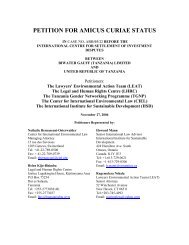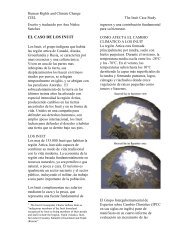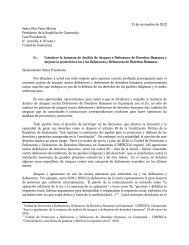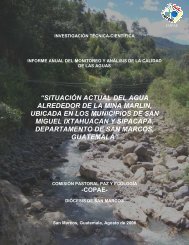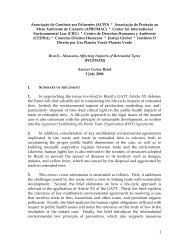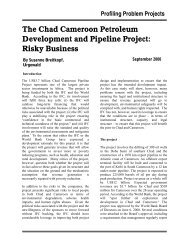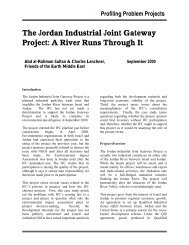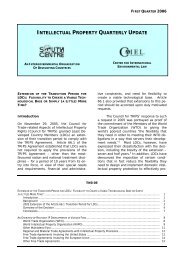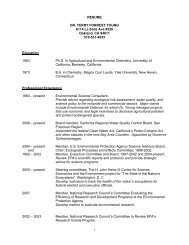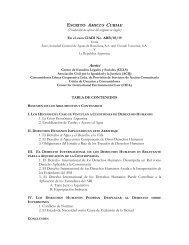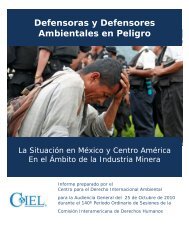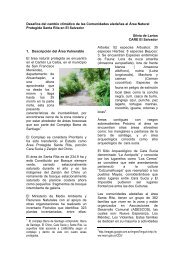International Law on Investment: The Minimum Standard of Treatment
International Law on Investment: The Minimum Standard of Treatment
International Law on Investment: The Minimum Standard of Treatment
Create successful ePaper yourself
Turn your PDF publications into a flip-book with our unique Google optimized e-Paper software.
entertain a suit, if they subject it to undue delay, or if theyadminister justice in a seriously inadequate way." Pretence<strong>of</strong> form 24 would involve showing "the clear and maliciousmisapplicati<strong>on</strong> <strong>of</strong> the law". <strong>The</strong> Azinian Tribunal found thatthe evidence before it "dispels any shadow over the b<strong>on</strong>afides <strong>of</strong> the Mexican judgments".METALCLAD<strong>The</strong> Mexican government recently was forced to pay a U.S.company, Metalclad, US$16 milli<strong>on</strong> based <strong>on</strong> the refusal toallow Metalclad to operate a hazardous waste facility. <strong>The</strong>local Municipality <strong>of</strong> Guadalcazar blocked the operati<strong>on</strong> <strong>of</strong>the facility <strong>on</strong> an already severely polluted site by denying arequired c<strong>on</strong>structi<strong>on</strong> permit, and later the State Governor <strong>of</strong>San Luis de Potosí declared the site an ecological preserve.<strong>The</strong> Metalclad Tribunal ruled, c<strong>on</strong>trary to the Government <strong>of</strong>Mexico's interpretati<strong>on</strong> <strong>of</strong> Mexican law, that the Municipalityexceeded its authority, and found breaches <strong>of</strong> MST andexpropriati<strong>on</strong>.In finding a breach <strong>of</strong> MST, the Metalclad Tribunal held thatthe principle <strong>of</strong> transparency in article 102 <strong>of</strong> the NAFTAimposed <strong>on</strong> the central government <strong>of</strong> any Party a duty toclarify all the relevant legal requirements relating to aninvestment. 25 <strong>The</strong> Tribunal also observed that an underlyingobjective <strong>of</strong> NAFTA is to "ensure the successful implementati<strong>on</strong><strong>of</strong> investment initiatives". <strong>The</strong> Tribunal ultimatelyfound that Mexico had failed to ensure a transparent andpredictable framework for Metalclad's investment. 26Paradoxically, in spite <strong>of</strong> its emphasis <strong>on</strong> transparency, theTribunal ordered that the proceedings be c<strong>on</strong>fidential, subject<strong>on</strong>ly to disclosures required by applicable external standards,i.e., nati<strong>on</strong>al law.Subsequently, Mexico sought judicial review <strong>of</strong> theMetalclad Award in the place <strong>of</strong> arbitrati<strong>on</strong>, BritishColumbia. In May 2001, the Supreme Court <strong>of</strong> BritishColumbia set aside the findings <strong>of</strong> the award that related toMST. <strong>The</strong> court found that the arbitral tribunal, in making itsdecisi<strong>on</strong> <strong>on</strong> the basis <strong>of</strong> transparency, misstated the applicablelaw <strong>on</strong> fair and equitable treatment and exceeded itsjurisdicti<strong>on</strong> "because there are no transparency obligati<strong>on</strong>sc<strong>on</strong>tained in Chapter XI". 27 On MST, the court also distinguishedMST from c<strong>on</strong>venti<strong>on</strong>al law and stated that fair andequitable treatment and full protecti<strong>on</strong> and security are twopotential examples <strong>of</strong> MST, but do not stand <strong>on</strong> their own asindependent standards. 28 <strong>The</strong> court ultimately held for theclaimant <strong>on</strong> the grounds <strong>of</strong> expropriati<strong>on</strong>, citing the designati<strong>on</strong><strong>of</strong> the proposed site as an ecological preserve. 29S.D. MYERSA tribunal applying NAFTA's investment rules upheldanother U.S. investor's challenge to Canada's temporaryban <strong>on</strong> exports <strong>of</strong> polychlorinated biphenol (PCB) waste.PCB wastes are covered by the Basel C<strong>on</strong>venti<strong>on</strong> <strong>on</strong> theTransboundary Movement <strong>of</strong> Hazardous Wastes and subjectto that agreement's preference for domestic treatment.<strong>The</strong> tribunal composed by investment experts brushed4aside this preference, applied a "least trade restrictive" testto the Basel C<strong>on</strong>venti<strong>on</strong>, and asserted, without detailedanalysis, that Canada had other, equally effective regulatoryopti<strong>on</strong>s. <strong>The</strong> tribunal held that the export ban violatedNAFTA's nati<strong>on</strong>al treatment obligati<strong>on</strong> and the MST.In its discussi<strong>on</strong> <strong>on</strong> MST, the S.D. Myers Tribunal recognizedthat "when interpreting and applying the 'minimumstandard', a Chapter XI tribunal does not have an openendedmandate to sec<strong>on</strong>d-guess government decisi<strong>on</strong>making".<strong>The</strong> tribunal also stated that a breach <strong>of</strong> the MSToccurs <strong>on</strong>ly "when it is shown that an investor has beentreated in such an unjust or arbitrary manner that the treatmentrises to the level that is unacceptable from the internati<strong>on</strong>alperspective," and that "this determinati<strong>on</strong> must bemade in light <strong>of</strong> the high measure <strong>of</strong> deference that internati<strong>on</strong>allaw generally extends to the right <strong>of</strong> domestic authoritiesto regulate matters within their own borders". 30After articulating the MST in these terms, a majority <strong>of</strong> theTribunal "determine[d] that <strong>on</strong> the facts <strong>of</strong> the particularcase the breach <strong>of</strong> Article 1102 [<strong>on</strong> nati<strong>on</strong>al treatment]essentially establishes a breach <strong>of</strong> Article 1105 as well". 31One <strong>of</strong> the members <strong>of</strong> the S.D. Myers Tribunal dissentedfrom this view, noting that breach <strong>of</strong> another provisi<strong>on</strong> <strong>of</strong> theNAFTA is not a foundati<strong>on</strong> for a finding <strong>of</strong> a violati<strong>on</strong> <strong>of</strong> theMST. 32 This dissent c<strong>on</strong>forms to the FTC's subsequentNote <strong>of</strong> Interpretati<strong>on</strong> described below, in that a breach <strong>of</strong>c<strong>on</strong>venti<strong>on</strong>al internati<strong>on</strong>al norms does not establish abreach <strong>of</strong> MST.POPE & TALBOTIn May 1996, Canada and the United States signed theS<strong>of</strong>twood Lumber Agreement that temporarily settled theirdispute over Canada's alleged subsidizati<strong>on</strong> <strong>of</strong> s<strong>of</strong>twoodlumber. This agreement created, inter alia, a c<strong>on</strong>trol andquota system restricting the lumber exported to the UnitedStates. <strong>The</strong> claimant, a U.S. corporati<strong>on</strong>, argued that thesemeasures as applied by Canada c<strong>on</strong>stituted breaches <strong>of</strong> theNAFTA provisi<strong>on</strong>s <strong>on</strong> expropriati<strong>on</strong>, performance requirements,nati<strong>on</strong>al treatment, and MST. <strong>The</strong> arbitral tribunaldismissed all these claims, except for <strong>on</strong>e relating to MST,after finding that Canada's c<strong>on</strong>duct during the "verificati<strong>on</strong>review episode" 33Article 1105. 34denied the fair treatment required byIn its reas<strong>on</strong>ing, the Pope & Talbot Tribunal noted that "thelanguage <strong>of</strong> article 1105 suggests that those [fairness] elementsare included in the requirements <strong>of</strong> internati<strong>on</strong>allaw". 35 <strong>The</strong> Tribunal then observed that "another possibleinterpretati<strong>on</strong> <strong>of</strong> the presence <strong>of</strong> the fairness elements inArticle 1105 is that they are additive to the requirements <strong>of</strong>internati<strong>on</strong>al law. That is investors under NAFTA are entitledto the internati<strong>on</strong>al law minimum plus the fairness elements".36To support its interpretati<strong>on</strong>, the Pope & Talbot Tribunalresorted to the U.S. Model BIT <strong>of</strong> 1987, which, according tothe Tribunal, adopted the "additive character <strong>of</strong> the fairnessTHE CENTER FOR INTERNATIONAL ENVIRONMENTAL LAW AUGUST, 2003



